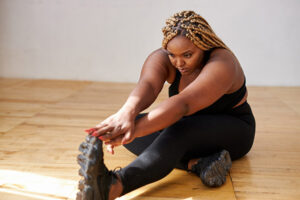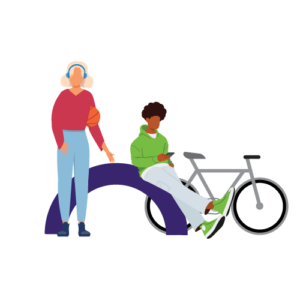Your teen will continue to grow and develop during puberty at a fast rate, while gaining more independence and learning all the skills they’ll need as an adult to keep themselves healthy.
Supporting and guiding them to stay active and eat well during this time will help them grow in a healthy way into adulthood.
Eating well
Grazing and larger portions
Your teen might snack more than eat regular meals and snacks spaced evenly throughout the day as before. If your teen is getting a variety of foods from the main food groups they are likely to get all the nutrients that they need. The Eatwell guide shows how much of what we eat should come from each food group to achieve a healthy, balanced diet.
Fruit, crumpets, bagels, pitta with healthy fillings, toasted teacakes, a bowl of low sugar cereal, a pot of yoghurt, cheese and crackers, cottage cheese, vegetable sticks and hummus are all great snack options.
Older teens around 15 to 18 years-old who are moderately active will need more calories than an average adult. Giving them extra carbohydrates at meal times to meet their energy needs will help stop them snacking on unhealthy biscuits, crisps, sweets or fizzy drinks later.
Banning certain foods or drinks can make them more desirable or can lead to feelings of guilt damaging a young person’s relationship with food. Think about changes you can make as a family to gradually reduce the amount of foods high is fat, sugar and salt in the home.
Junk food advertising is very powerful and can influence young people's choices without them realising. The following film from Bite Back campaign shows all the ways young people can be influenced.
Do we really choose what we eat? Eight people turned up to a restaurant for what they believed was the start of a social experiment. Little did they know, it was really the end of it.

Skipping breakfast
Mornings can be a rush for teenagers, which means they might miss breakfast. They might skip it on purpose if they think this will help them lose weight. This can affect their concentration during lessons and affect two very important nutrients for your teen – calcium and iron.
Encourage your teen to make time for breakfast, sit with them to eat if you can to role model good habits.
Most breakfast cereals are a good source of energy and fibre and are generally fortified with vitamins and minerals including iron, and accompanying milk or milk alternative provides calcium (check these are fortified with 120mg calcium/100ml). Puffed wheat, crisped rice, cornflakes and malted wheat are good but avoid brands that are high in sugar and salt. Fruit juice is a good source of vitamin C, and vitamin C helps the body to absorb iron from cereal foods.
Lunch
Healthier Families has a range of quick, easy, healthier lunchbox ideas and tips.
Vegan and vegetarian diets
 Some teens will decide to become vegetarian or vegan for ethical, environmental or health reasons. Meat and animal products contain iron, zinc and vitamin B12 so any alternatives used will have to replace those nutrients or your teen could become deficient in those key vitamins.
Some teens will decide to become vegetarian or vegan for ethical, environmental or health reasons. Meat and animal products contain iron, zinc and vitamin B12 so any alternatives used will have to replace those nutrients or your teen could become deficient in those key vitamins.
Sugary drinks
Many teens exceed the daily recommended amount of sugar with sugary drinks. This affects their teeth but can lead to other complications later in life including excess weight and diabetes.
Drinking a 500ml drink every day gives your teen an extra 1,700 calories a week which can lead to a gradual weight gain. You can help your teen cut down on soft drinks by keeping fresh tap water in the fridge and reducing the amount of soft drinks you have in the house. Smoothies, milk-based drinks and fresh fruit juices can still be quite high in calories so stick to 150ml servings to get one of your five-a-day.
Peer pressure, social media and food fads
Your teen will probably come across some unhelpful claims around food, weight, and body image with celebrity endorsed diets, weight loss pills and supplements promoted to them through social media. Visit our body image and eating page for more information and support if you are concerned your teen is controlling what they eat or developing an eating disorder.
Reduction in key nutrients
Calcium and vitamin D help grow strong bones as a teenager and later in life. Dairy products are the best source of calcium and vitamin D helps the body absorb calcium. Young people with darker skin, who spend longer indoors due to a disability, or who live in a residential setting or choose to stay inside for long periods can become deficient.
Encourage your teen to get outside every day during the summer months and take a 10ug vitamin D supplement during the winter months (October to April). Speak to your GP who can do a blood test to check your child’s vitamin D level if you are concerned this might be low.
Iron and zinc are vital for growth and development. Iron is an important component of healthy blood and alongside zinc, helps maintain a strong immune system. Adolescent boys and girls need more iron but girls are more at risk of deficiency once periods start and the impact of dieting or becoming a vegetarian. Not getting enough iron can impact on health and development such increased risk of infection and lower energy levels which can contribute to lower academic attainment.
Help your teen develop the life skills needed to support a healthy weight include how to cook, write a shopping list, plan a weekly menu on a budget, read food labels or do the washing up.
Keeping active
 Encourage your teen to be active throughout the day, aiming to do a minimum of 60 minutes moderately strenuous activity a day. This is the sort of activity that makes your heart rate increase and makes you breathless. It can be hard for your young person to find the motivation to get up and be active but there are ways of building it into our daily routines. Spread activity throughout your day to break up times spent sitting or lying down. Start by reducing screen time for the whole family.
Encourage your teen to be active throughout the day, aiming to do a minimum of 60 minutes moderately strenuous activity a day. This is the sort of activity that makes your heart rate increase and makes you breathless. It can be hard for your young person to find the motivation to get up and be active but there are ways of building it into our daily routines. Spread activity throughout your day to break up times spent sitting or lying down. Start by reducing screen time for the whole family.
The benefits of physical activities
Exercise can have a big impact on a person's mental health and confidence. Other benefits include:
- improved mood
- better sleep
- increased energy levels
- reduced stress and anxiety levels
- better attention levels and performance at school.
Exercise plans
Suggest they spread out their activity throughout the day to fit in with life, school and daily routines. The aim is to reduce the time spent sitting or lying down and break up long periods of inertia with some form of activity.
Your teen will need to do moderately strenuous activity and strengthening activities for their muscles and bones. Gymnastics, football, jumping and martial arts are all good activities to build strength.
Ways to keep active
- Walking and cycling are great ways of getting active. Walk or cycle to the park, shops, or school whenever possible.
- Look for free activities in your area such as a Parkrun, or find a treasure or nature trail, park or wood. Parkruns take place all over the country including Kent. They are organised runs held at weekends for all abilities, absolute beginners are welcome. Junior runs happen alongside adult ones, so the whole family can get involved.
- Check out local clubs for running, cycling, netball, football, rugby or swimming.
- Download some online exercises. This NHS link has a beginners aerobic workout, which needs no special equipment.
- Load up your favourite tunes and get dancing.
- Other groups like youth clubs, scouts or guides often do lots of physical activities.
Walking is a great way to increase fitness levels, and is a good opportunity to do something active together. Encouraging your child to break up homework with short bursts of physical activity such as yoga stretches, star jumps, or skipping, or even just to stand and move around while doing homework can be a good way to include physical activity into the day.
Talking to young people about weight
No matter your shape or size you can help to support your child by leading the way with healthy habits.
- Talk about how good you feel after exercise
- How much you enjoy eating fruit and vegetables.
- Let them know getting enough sleep and talking about worries can make us feel happier and more able to cope.
Here’s some things to avoid that will help support your child’s self-esteem and wellbeing:
- Don’t comment on someone’s appearance or call people lazy, greedy or fat as this can affect how children feel about their own body. Teach your child that everyone deserves respect – whatever their body size, shape or ability.
- Don’t talk about diets or dieting. Focus on all the things you’re doing to live healthily and all the amazing things your body can do.
- Don’t use food to show love because this can lead to comfort eating. Find other ways to show your love, like spending quality time together, giving a hug or praise instead.
- Don’t ban treats altogether because it can make children want them more and hide their eating from you.
By enjoying healthy meals and engaging in physical activity together as a family, you can help your child to feel supported in making positive, healthy lifestyle changes that can go far beyond weight loss.
What to do if you think your child is overweight or they are worried about their weight
It can be hard to watch your child struggle with their weight. Weight can be a sensitive subject and you may be worried about discussing this with your teen. Visit our talking to your teen about their weight page for more support on this sensitive issue.
For families who might need additional support
For children with additional needs, staying active is also very important. Start by choosing activities your child is interested in and adapt them. Visit NHS Healthier Families for more information and support.
Neurodivergent young people may have issues around food that can be complex. Your child may restrict certain foods due to sensory processing challenges or anxiety in social situations. They may feel the need for the control and familiarity that restricted eating brings, and sometimes they develop strict routines around exercise and calorie counting. Autism.org.uk has advice for parents of neurodivergent children.
Kent School Health offers one-to-one support based on your child’s unique needs. Visit our special educational needs or neurodivergence pages for more information on the support available for you and your child.
Useful resources
- Healthier Families has more information on healthy recipes including packed lunch ideas, snack swaps, nutritional advice and top tips and activities to help the whole family to stay healthy. Sign up for the Healthy Steps programme for weekly email support tailored over eight weeks for your family.
- Kent Sport has and information on getting more active, making lifestyle changes that will benefit the whole family.
- Contact the Kent School Health Service - we really want to hear from you if you feel you need more support for you and your child. We can offer one-to-one support on aspects of your child’s growth.
- Check out One You Kent’s exclusive ‘Food Smart’ film seriesfor some great healthy eating ideas, top tips and advice on food labelling, cooking on a budget, snacking well and watching your sugar intake. Small changes can make a big difference and One You Kent advisors can support you to make the changes that will work for you. So whether you want to quit smoking, lose weight or just generally feel better about life, One You Kent lifestyle advisors can help. This is a free service from the NHS offered over six sessions. Phone 0300 123 1220 for more information.
- The Children’s Dietetic Service has a range of online resources you may find helpful on fussy eating and food allergies.